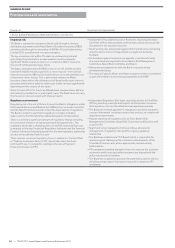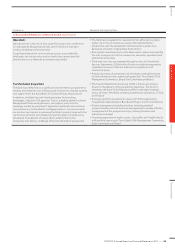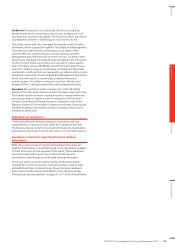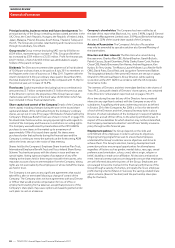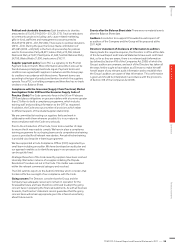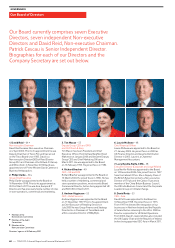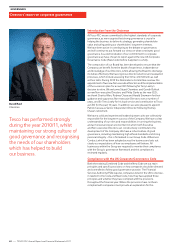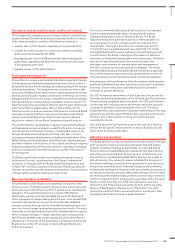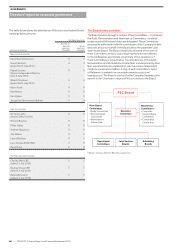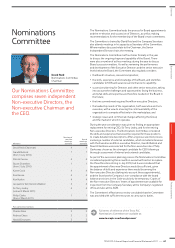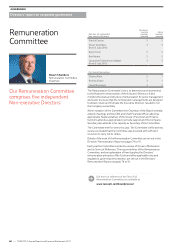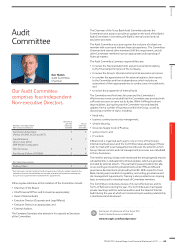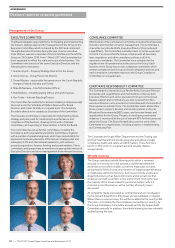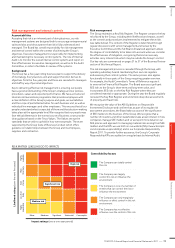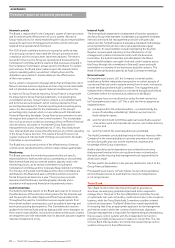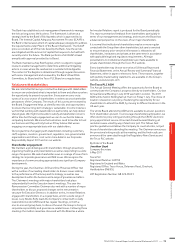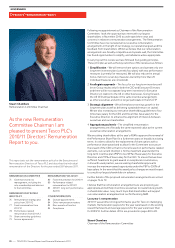Tesco 2011 Annual Report Download - page 68
Download and view the complete annual report
Please find page 68 of the 2011 Tesco annual report below. You can navigate through the pages in the report by either clicking on the pages listed below, or by using the keyword search tool below to find specific information within the annual report.
Board responsibilities
The Board held nine scheduled meetings during the year. It also holds
an annual two-day off-site meeting, which considers the Group’s
strategy. The Board maintains a clear Schedule of Matters Reserved for
Board Decision in order to ensure that it has appropriate overall control
of the Group’s affairs. The Matters Reserved include the approval of:
• the Company’s strategic and operating plans;
• annual and interim financial statements;
• major acquisitions and disposals;
• authority levels for expenditure;
• treasury policies;
• risk management and internal control systems;
• Group governance policies; and
• succession planning for senior executives.
The Board delegates to management the detailed planning and
implementation of these matters in accordance with appropriate risk
parameters. The Board monitors compliance with policy and
achievement against objectives by holding management accountable
for its activities through regular updates. In addition, each business unit
within the Group is required to update the Board on a regular basis,
giving the Board the opportunity to understand and explore issues in
depth as appropriate. All Directors have access to the services of the
Company Secretary and may take independent professional advice
at the Company’s expense in conducting their duties. The Company
provides insurance cover and indemnities for its Directors and Officers.
During the year ended 26 February 2011, the Board’s scheduled
activities included:
• receiving reports from key businesses within the Group;
• receiving regular reports on the financial position of the Group and
the various businesses within the Group;
• approving the budget and long-term plan for the Group;
• approving interim and full-year results;
• discussing and approving Group strategy;
• considering opportunities for business development;
• discussing risk management and controls within the Group, including
a detailed review of the Key Risk Register;
• receiving reports from the Remuneration Committee, Audit
Committee and Nominations Committee and other key committees
within the Group including the Compliance Committee and
Corporate Responsibility Committee;
• receiving reports on governance issues affecting the Group; and
• conducting a review of the effectiveness of the Board.
The Chairman
There is a clear and effective division of accountability and responsibility
between the roles of our Chairman and CEO and these are set out in
writing. The Chairman has primary responsibility for leading the Board,
to promote openness and effective debate, setting its agenda and
ensuring sufficient time is given to strategic issues. The Chairman is
also responsible for ensuring that the Board acts in the best interests
of the Company’s stakeholders and guiding the Company’s business
conduct and ethical standards. The Chairman has regular one-to-one
meetings with the CEO and also separate group and individual
meetings with the Non-executive Directors. The CEO has executive
responsibilities for the day-to-day operations and performance of the
Group, making proposals to the Board for the strategic development
of the Group and ensuring effective communication to employees
and shareholders.
Senior Independent Director
Rodney Chase was the Senior Independent Director until his retirement
on 2 July 2010. Patrick Cescau, who has served on the Board since
February 2009, was appointed Senior Independent Director from 3 July
2010. Patrick was selected for the role because of his experience and
expertise, both as an Executive and a Non-executive Director. Patrick
was Group Chief Executive of Unilever from 2005 to 2009. Prior to that
he was Chairman of Unilever plc and Vice Chairman of Unilever NV.
He joined Unilever in 1973 and became Finance Director of Unilever
Indonesia in 1986, then led the business in Portugal, before returning
to Indonesia as Chairman/CEO in 1991. Patrick ran the Van den Bergh
Foods and Lipton beverage and foods businesses in the US from 1995
to 1998, before becoming Group Finance Director in 1999 and Foods
Director in 2001. He has been a Non-executive Director of Pearson plc
since 2002 and a Director of INSEAD since 2009.
In his role as Senior Independent Director (SID), Patrick Cescau is
available to assist in resolving shareholder concerns should alternative
channels be exhausted or inappropriate. The SID’s role includes
responsibility for Chairman appraisal and succession.
Non-executive Directors
Our Non-executive Directors have a wide range of skills and experience.
They provide constructive challenge and help to develop our strategy.
The Non-executive Directors have satisfied themselves with regard to
the integrity of the Group’s financial information, financial controls and
risk management systems.
The independence of each Non-executive Director is assessed annually
and the Board makes a careful assessment of the time commitment
required from the Chairman and Non-executive Directors to discharge
their roles properly. During the year the Chairman conducted a rigorous
assessment of the effectiveness of each Non-executive Director’s
performance and independence, as well as a review of their contribution
to the Board. Particular consideration was given to the independence
of Karen Cook and Ken Hydon, who have both served for six years.
The review concluded that each Non-executive Director continues
to be independent and effective and to demonstrate commitment
to the role.
Our Non-executive Directors have historically been appointed for
a period of three years and have then submitted themselves for
re-election on rotation if they wished to continue to serve and remain
independent. Going forward, in line with the provisions of the New
Code, all Non-executive Directors will be submitted for re-election
on an annual basis, subject to remaining independent. The terms
and conditions of appointment of our Non-executive Directors are
available for inspection at the Company’s registered office.
64
—
TESCO PLC Annual Report and Financial Statements 2011
GOVERNANCE
Directors’ report on corporate governance


